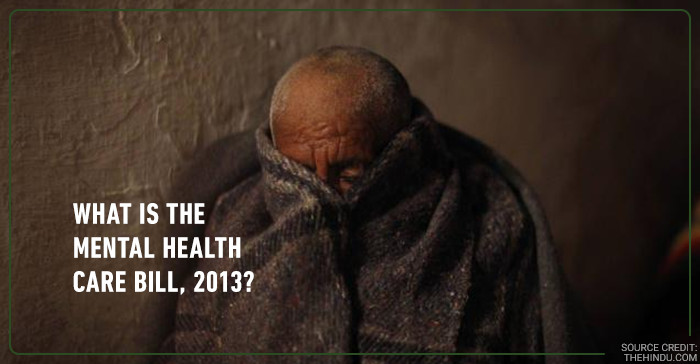Someone you know could have mental health issues. What is India planning to do?

“20% of the population will be suffering from mental health issues by 2020 in India.” (Wall Street Journal)
Though the issue of mental illness is not new to India, the increasing number of people affected by it is a growing concern. It is estimated that there is only one psychiatrist for every 343,000 people and most mental health institutions are in a dismal state. To combat these grim facts, the Parliament sought to bring about the Mental Health Care Bill, 2013 to repeal the old Mental Health Act, 1987.
Though, the Bill hasn’t been passed yet by the parliament, it hopes to address the inadequacies of the old Act which. This includes protection of people with mental illnesses and access to mental health care.
The following are some of the key features of the Mental Health Care Bill, 2013:
Giving rights to people with mental illness:
Access to mental health care and treatment from government-funded or government-run services. This includes the right to access, affordable and good quality mental health.
Access to mental health care and treatment from government-funded or government-run services. This includes the right to access, affordable and good quality mental health.
Free legal services and access to their medical records.
Provisions to make complaints about unsatisfactory practices of mental health care or services.
Handing over power of judgement to a surrogate decision maker:
If a person feels that he/she is incapable of making judgements then he/she can appoint a surrogate decision maker through an advance directive (a legal document that replaces the mentally challenged person from making decisions and gives to a replacement chosen by him/her).
The person/surrogate will be able to choose on behalf of the mentally challenged, on how the patient will be treated and for how long.
This power of attorney certificate will have to be certified by a medical practitioner first registered with the medical health board.
If the relative/caregiver nominated by the mentally challenged person does not wish to follow the directive, he/she can make an application to the Mental Health Board in order to review, alter or cancel the advance directive.
With rising cases of depression and mental illnesses, India has become the country with the highest number of suicides. There is an immediate need for attention to be diverted to Mental Health issues and the need for more medical professionals and establishments. What are your views on the same? Please write to us at jagoorein@gmail.com or tweet to us @jaagoRe.
*We will be continuing the key points from the Mental Health Care Act, 2013 in our next article.*
Sources:
PRS
Wall Street Journal
TNhealth
Share this story on





